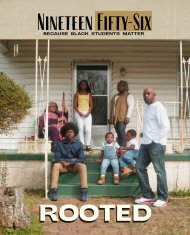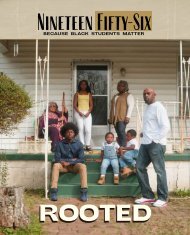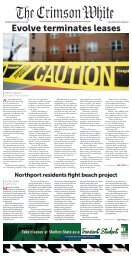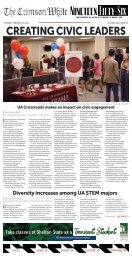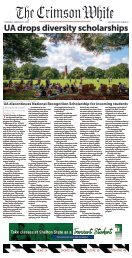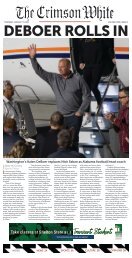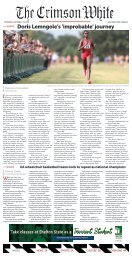Nineteen Fifty-Six Vol. 1 No. 2 Voice
This is the October issue of Nineteen Fifty-Six magazine. The theme, Voice: Your Voice has Value, is especially important in the weeks leading up to the presidential election.
This is the October issue of Nineteen Fifty-Six magazine. The theme, Voice: Your Voice has Value, is especially important in the weeks leading up to the presidential election.
You also want an ePaper? Increase the reach of your titles
YUMPU automatically turns print PDFs into web optimized ePapers that Google loves.
in Mississippi from 90 percent to<br />
6 percent. Mississippi established<br />
a precedent that many southern<br />
states would quickly follow by<br />
adopting their own versions of<br />
restrictive laws, known as Jim<br />
Crow laws. This code combined<br />
with racial violence continued for<br />
another 70 years.<br />
By the 1960s, citizens all over the<br />
country would have participated in<br />
persistent protests for more than<br />
a decade. <strong>No</strong>n-violent protests<br />
were confronted frequently with<br />
murderous violence that was<br />
televised globally. The general<br />
public was appalled and the federal<br />
government would be forced<br />
to ratify the 24th amendment,<br />
forbidding poll tax. A year later,<br />
the Voting Rights Act prohibited<br />
the residual tactics that reinforced<br />
voter suppression and the act<br />
established federal oversight over<br />
areas that had a history of voter<br />
discrimination. More policies<br />
would be produced to ensure the<br />
protection of voting rights- but to<br />
no avail. Federal oversight had less<br />
agency to hold states accountable,<br />
and after party realignment<br />
occurred, many states instituted<br />
new restrictions— except this time<br />
they offered less transparency like<br />
in the past, and instead have coded<br />
the language so much so that it<br />
seems to mitigate election fraud.<br />
This is where dog whistle politics<br />
began to rear its ugly head.<br />
CODED LANGUAGE<br />
TODAY<br />
The power of the federal oversight<br />
clause of the Voting Rights Act<br />
was reduced in 2013 by the U.S.<br />
Supreme Court which would<br />
have intervened with the voter<br />
registration regulations. These<br />
states with majority republican<br />
legislatures, created a variety of<br />
qualifications including having<br />
tangible identification or proof of<br />
citizenship, frequently purging<br />
lists of inactive names from<br />
registration polls, shortening<br />
voting periods of time, and<br />
limiting access to absentee<br />
ballots and mail in voting. Sound<br />
familiar yet?<br />
Although Trump believes<br />
mail-in voting will increase<br />
voter fraud and advantage<br />
Democrats, Stanford University<br />
researchers have released The<br />
Neutral Partisan Effects of Voteby-Mail<br />
assessment that asserts<br />
there is no partisan advantage<br />
for either party. Furthermore,<br />
even after being told by many<br />
experts that election fraud in the<br />
U.S. is rare, Trump established<br />
the Presidential Advisory<br />
Commission on Election Integrity<br />
to investigate voter fraud which<br />
was disbanded in 2018 after they<br />
found no evidence to support any<br />
claim to election fraud. Trump’s<br />
opposition to additional funding<br />
for the USPS proved problematic<br />
when the COVID-19 pandemic<br />
hit the U.S. The postal service<br />
company was not given any<br />
funding in the original stimulus<br />
bill text and their bailout request<br />
was rejected by the White House.<br />
Shutting down operations was<br />
beginning to look like reality.<br />
Because of the pandemic, many<br />
states have changed their<br />
procedure for absentee ballots,<br />
so more citizens can mail in their<br />
vote. Without the USPS, this could<br />
severely limit access to voting on<br />
a national level.<br />
Even with all of this information,<br />
it begs the question if any<br />
form of restrictive laws are<br />
interconnected with voter<br />
suppression. The Assessment<br />
of Minority Voting Rights<br />
Access comprehensive report<br />
would answer yes and that these<br />
laws “have a disparate impact<br />
on voters of color and poor<br />
citizens.” The study goes on to<br />
critique voter identification laws<br />
as placing an undue burden on<br />
citizens by requiring them to<br />
pay fees in order to obtain these<br />
credentials. This is supported<br />
by the correlation of states with<br />
voter identification laws also<br />
having an increased gap between<br />
white and minority voters. The<br />
report also investigates the<br />
reduction of early voting and how<br />
it creates long waiting periods<br />
that directly limit minority<br />
citizen’s access to the polls.<br />
This coupled with the closing<br />
of polling stations in areas that<br />
have higher minority populations<br />
is suspect. Think about how<br />
Georgia’s 2018 gubernatorial race<br />
between Stacey Abrams and Brian<br />
Kemp made headlines everyday.<br />
It was a disastrous display of<br />
voter suppression with a bus full<br />
of Black senior citizens being<br />
blocked from voting, as one of<br />
the most incredulous instances.<br />
Brian Kemp was able to use his<br />
position of Secretary of State to<br />
enact last minute regulations that<br />
suppressed Georgian votes, thus<br />
securing his victory. The Minority<br />
Voting Rights Access report<br />
urges the U.S. Congress to restore<br />
the federal oversight clause to<br />
the Voting Rights Act. Seeing as<br />
“racial discrimination in voting<br />
has been a particularly pernicious<br />
and enduring American problem.”<br />
It is safe to say that voting rights<br />
will continue to be an ongoing<br />
issue. Although legislation may<br />
aid in the protection of these<br />
rights, the persistent nature<br />
of systemic racism and white<br />
supremacy will continue to<br />
morph into legislation and legal<br />
doctrine that are conceptually<br />
unrecognizable, but produce the<br />
same outcome where minorities<br />
are exploited.<br />
14






